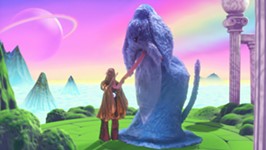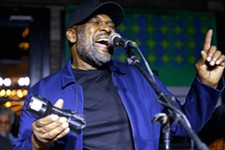The Urban Experience
Dâm-Funk's intergalactic jam
By Thomas Fawcett, 3:08PM, Tue. Mar. 16, 2010
After my interview with Dâm-Funk, the 38-year-old Los Angeles DJ/keyboardist/composer, I sent an email to his manager letting him know it went well. “Yeah,” he replied knowingly. “We call him the Funk Yoda.”
Indeed, nuggets of funk wisdom Damon Riddick drops. His five-LP box set, Toeachizown (Stones Throw), is as funky as it is ambitious. Whatever you do, just don’t call it chillwave.
Bump & Hustle caught up with the Ambassador of Boogie before he takes over Austin – playing an incredible 15 sets in four days – to talk about extraterrestrials, his favorite feline, and bullshit genres like chillwave.
Bump & Hustle: I first got hip to you about three months ago when a friend in San Fran emailed me a link to some of your music, with the words DAM FUNK written in all caps with 10 exclamation points. Up to that point I didn't really know of anyone doing what you’re doing. My first thought was, "Did this dude just step out of a time machine from 1983?"
Dam-Funk: Yeah, I feel you. I’ve been doing this thing for a while but it’s just now getting to the masses and I appreciate it.
B&H: Tell me a little about the music you champion and love. Some people call it boogie and some people call it modern funk.
DF: What I spin and am known for collecting is the boogie genre. Sort of like post-disco, stuff on Raven and Salsoul records, stuff like that. Funk has been my main anchor and my creativity that I express to people. I consider it to be modern funk because the funk that I focus on is from the late 1970s and 1980s period, not the 1960s and early 1970s, which has been hammered into our heads for the past 20 years through hip-hop samples and what have you. Throughout that time nobody has paid attention to the fantastic music that came out of the late 1970s to mid 1980s. I was just doing it on my own with my head down, trying to run through the football field to the goal and all of a sudden I looked up and people were finally giving this sound respect, so I appreciate people giving it a chance.
B&H: That 1960s and 1970s sound you are talking about has really gone mainstream in a lot of ways. Do you see boogie and modern funk having the same potential to crossover?
DF: It could but why it won’t is because the funk from the 1960s and early 1970s is more accessible. It’s easier because of the chords, notes, and subject matter. It’s nothing but party jams – get on the good foot. Now it’s a little deeper and darker. I don’t see this kind of funk becoming mainstream. It would be great but I would hope that the respect stays in tact, that some of these kids attached to fads don’t water it down so much that it becomes something else. For instance, there are few things happening with modern funk. I try to focus on beautiful chords while still trying to keep the street vibe on the bottom. It’s kind of related to G-funk but without the whole gangsterism on top of it. Sometimes on the West Coast we call it slumpers, because you can just ride to ‘em. Now we’ve got things like chillwave coming out that is more easily digestible. It always happens like that, like an Elvis or whatever. It has nuances of the real shit but then something else gets created to make it more easily digestible like this chillwave stuff. I like all types of music but it’s weird when you see an idea come out and people latch onto it and then something else gets added on to make it more digestible to certain crowds. I’m not gonna be affected by it, I’m just gonna keep representing modern funk.
B&H: I haven’t heard many people since George Clinton talk about “The Funk” with a capital “F” as much as you do. You talk about “The Funk” like it’s an entity, man.
DF: It’s the ideology, the way you treat people, the way you look at life outside of the matrix. I wish all people aspired to get out of the matrix. I’ve been in the matrix for a minute but I didn’t want to stay there forever. The funk is about that, it’s about freeing your mind. It’s about not just making a track that some dumbass can slide down a pole to, but one where the chorus can heal you and that’s what the funk represents to me. You can be healed by funk or it can take you into different mind frames. I really do connect music into those kind of things. It’s a spiritual thing, it’s not a religious thing. It’s more like getting in touch with things that are beyond Earth. I want to use funk as a catalyst to speak to people and touch on ideas that people can think of – remembering their childhood or experiencing a beautiful sunset or just getting away from the rat race we deal with everyday. It’s not just about making a track in an MPC-2000, it’s about making music that actually touches people and that’s why I talk about the funk in that way.
B&H: Listening to your album, you seem to be part of a long tradition of black artists, from Sun Ra to Erykah Badu, that's compelled by the cosmos. What is it about space that intrigues you?
DF: I was interested in those kinds of things and saw a few things growing up. I realized that we are not the only people in this universe. We would be so selfish to think that we are the only living beings in that entire universe when we look up into the sky and see those millions of trillions of stars sparkling. My hope is that eventually we will have some kind of first contact that will hopefully help the human race heal from all the dumb things we deal with. At this point, I don’t think they would even want to pass by and acknowledge us because we are so primitive. The reason why I look at things on a galactic level is that I want to emote those feelings out there so that whoever is out there listening will know that someone down here is making music and being creative and treating people the way they should be treated in order to progress to that next level to eventually interact with people that are not of this world. That’s where I get the galactic connection with my music. You can forget about it sometimes because we’re all busy paying our rent and car payments, but I do keep it in the back of my mind.
B&H: Talk to me about the link between funk and outer space, because it’s always been there. Everyone making funky music from Sun Ra to George Clinton has made this connection to outer space. Why do you think that is?
DF: Because the original people that came from the motherland had a space connection, had a galactic connection, and the drums have always been passed down even if it’s secretly. It’s always been the message system that’s been translated and passed down. The funk has always been there. It’s just something that gets packaged differently for the time period we live in. I’m lacing the funk with electronic instruments, before it was mainly drums. Before me it was guitar riffs or those kinds of things. It’s just something that’s in the blood, it comes from the motherland. The motherland was touched on and created by galactic forces, I really believe, and that’s just the lineage that it has. That’s why funk is about that. The chords can transport you, man, if you really listen carefully and chill and just relax. I’m trying to touch on that and the funk that came before us. There’s just a connection.
B&H: And one of your songs is about seeing a UFO as a child, right?
DF: Yeah, “Brookside Park.” We still really don’t know what it was and nobody wants to talk about it but those kinds of experiences as a kid have confirmed even more to me that we’re not alone. I want to take some of the experiences that I’ve seen and put it into music. I just don’t want any men in black showing up at my door, that’s why I didn’t want to be doing too many interviews anymore speaking about that subject, you know what I’m saying? I do know that if we concentrate and pay attention to what is silently around us, you can pick up on things. We’re always moving too fast but I choose to slow things down and check things out.
B&H: Your music seems quintessentially Los Angeles to me. Do you consider your music a reflection of the city that you live in?
DF: Yes, but I also consider it to be music that I would like all regions to get into and just have a postcard from Los Angeles to just vibe out on. I wanted to show that it’s not all about just one side that people have seen. You know in Menace II Society there are people walking down the sidewalk with sawed-off shotguns but that’s not how it is in L.A. There are so many different nuances and sides to the city. There are different people expressing themselves creatively. This album will hopefully give people a different take, my experience. Being from Pasadena, me and my friends laugh about it and say we’ve been waiting to hear an album like this. It’s a long album with long tracks, instrumentals, and vocals. It’s just something we’ve always wanted to put out and thank god Peanut Butter Wolf had the vision to release it like this. I just hope people get into it. They definitely won’t get it overnight but when the dust settles I hope that people will be able to look back and say, “Man, that cat really did release something special five years ago,” as they sit there with the box set in their hand. All of this stuff has a future meaning to it, I have it all planned out. All this silly fad stuff around me gets championed and what I’m doing gets kicked and ridiculed. These fly-by-night artists come out and the blogosphere goes nuts over them because they hit a nice little beautiful chord here and there yet still Toeachizown gets panned because it’s an urban experience and not like a suburban thing. I hope that people can see that we’re all in this together, everybody can listen to this music. I just hope people respect the modern funk and not try to change what it is into some different genre name. This is funk that I’m making and it deserves respect.
B&H: Well, you’ve definitely been holding it down with the Funkmosphere parties you throw in LA. How long has that been going on and what’s the vibe like?
DF: Funkmosphere will be four years in July and we’ve doing it at a place in Culver City called Carbon Bar. We have four resident DJs – Billy Goods, DJ Randy Watson, Laroj, and Matt Respect. We have a lot of different DJs that come by. A lot of people that play boogie have a disco and house connection as well, so cats from different places come check us out and play. We have a lot of pop-lockers that come because there’s no place in L.A. for pop-lockers to do their thing. It’s all wax. We only do Serato like once a month, which I just started to be fair to some cats that are traveling from out of town. It is fair, they can’t just take a big crate of records with them everywhere they go, but a true DJ will make his way. I mean, what were DJs doing before they had Serato? So Funkmosphere is a place that we play boogie, modern soul, electro-funk, and modern funk. It’s a cool place, nobody’s tripping, there are all different races. It’s a beautiful thing and I’m very proud of it.
B&H: You are the same age and of the same generation as a lot of the West Coast hip-hop pioneers. Do you feel a part of that generation or are you connected to those dudes at all?
DF: Yeah, I’m connected with them. I just spoke with MC Eiht the other day. I still have a lot of respect for the cats I worked with. Thing is, I just feel like we have another chance now through some of the things that I’m doing. A lot of things went down in the 1990s, as far as things getting attached to the gangter rap-ism, if you will. There were great cats in that scene that played instruments, keyboards and things like that. I’m just trying to keep that door open so that cats can do what we’re doing, build things, and travel the world. That’s why I’m on my best behavior when I travel the world. It’s time to see that brothers from L.A. can conduct themselves in a respectful manner. It should be all about the music, not about getting girls or anything like that, but just sharing the music with the people that I go visit, sharing quality music, not just doing a crowd-pleaser like playing “Engine Engine Number 9,” by Black Sheep just to pump the crowd up. I want to challenge the audience with stuff they might never have heard. That’s the tradition of the West Coast, we always think of being an underdog even with hip-hop. Just like now the blogosphere won’t give Toeachizown its full props and they’d rather give accolades to these new cats with their stupid genre names. I just have to come out here and show people you can stand for something and keep it top shelf. I want to keep it top shelf coming from the West Coast.
B&H: So you truly are the Ambassador of Boogie.
DF: Somebody else made up that name. I would never coin myself ambassador of anything. I just consider myself someone that is respectful of the funk and pays back some of the artists that came before me. If someone wants to appoint me to something like that, who knows, two albums down the road I might be having a different sound but it will always be funk-based.
B&H: Let’s talk about your live show a bit. Your music is largely instrumental so I’m not exactly sure what to expect from you when you come to SXSW.
DF: I’m gonna be doing a combination of DJing and live. The reason I’m sticking with that before I do my next album down the road is because there are still people that know me from certain haunts, certain circles like Wax Poetics circles, crate digging circles, and Funkmosphere circles that know me for that. Then there are other people that know me for the original material. I don’t want to disappoint people who are counting on me to drop a 45 that they might not have heard from 1983 from some obscure group. Then I don’t want to disappoint people who want to hear me do a synthesizer solo so I’m gonna combine both. It is time for people to see that it is connected with where I come from and then taking it into the future. It’s not gonna be all serious, it’s gonna be fun. I wanna have people partying and grooving. I don’t want to be associated with the cats that are looking at a laptop all night long with just a couple visuals behind them. Just like punk and other genres have energy on stage, that’s what I’m trying to bring whether it be me solo or with the group that I play with called Masterblaster.
B&H: Obviously you are a connoisseur of funk and rare music. If planet Earth were destroyed and you had to climb aboard the mothership, what are a few records you would never leave behind?
DF: “17 Days” from Prince and the Revolution, “Just a Touch of Love” by Slave, “I Want You For Myself” from George Duke, the entire Prefab Sprout album called Steve McQueen, or in America it’s known as Two Wheels Good. Anything from Todd Rundgren, mostly his late 1970s to early 1980s work. Also the track from Starshine called “All I Need Is You.” Those are all things I’d love to have on board if I ever left.
B&H: I’ve seen a couple promo photos with you and a big cat. So is that your cat or what’s up with that?
DF: Yeah, his name is Tiger. He’s a good cat, he’s my friend.
B&H: Does he travel with you?
DF: Nah, he stays in L.A.
A note to readers: Bold and uncensored, The Austin Chronicle has been Austin’s independent news source for over 40 years, expressing the community’s political and environmental concerns and supporting its active cultural scene. Now more than ever, we need your support to continue supplying Austin with independent, free press. If real news is important to you, please consider making a donation of $5, $10 or whatever you can afford, to help keep our journalism on stands.










